Abstract
The extensive literature on nutrition in pregnancy is reviewed with special reference to international experience, including observations on nutritional trials in pregnancy, pregnancy during famines caused by war, and studies of birth-weight in relation to pregnancy interval, parity and multiple pregnancies. Recent research on the significance of fetal nutrition suggests that ”small-for-dates” infants, i.e., those that are developmentally retarded in utero, suffer long-term developmental sequelae. A high world-wide incidence of small-for-dates births was reported by the World Health Organization in 1960.
Although a definite correlation has been found between socio-economic status and birth-weight, it is not known to what extent the smaller birth-weights observed in the lower socio-economic groups can be improved by specific nutritional measures. In addition to the general advice given on maternal nutrition and family-planning, further studies are needed to determine the precise means of achieving improvement in fetal nutrition and a better outcome of pregnancy.
Full text
PDF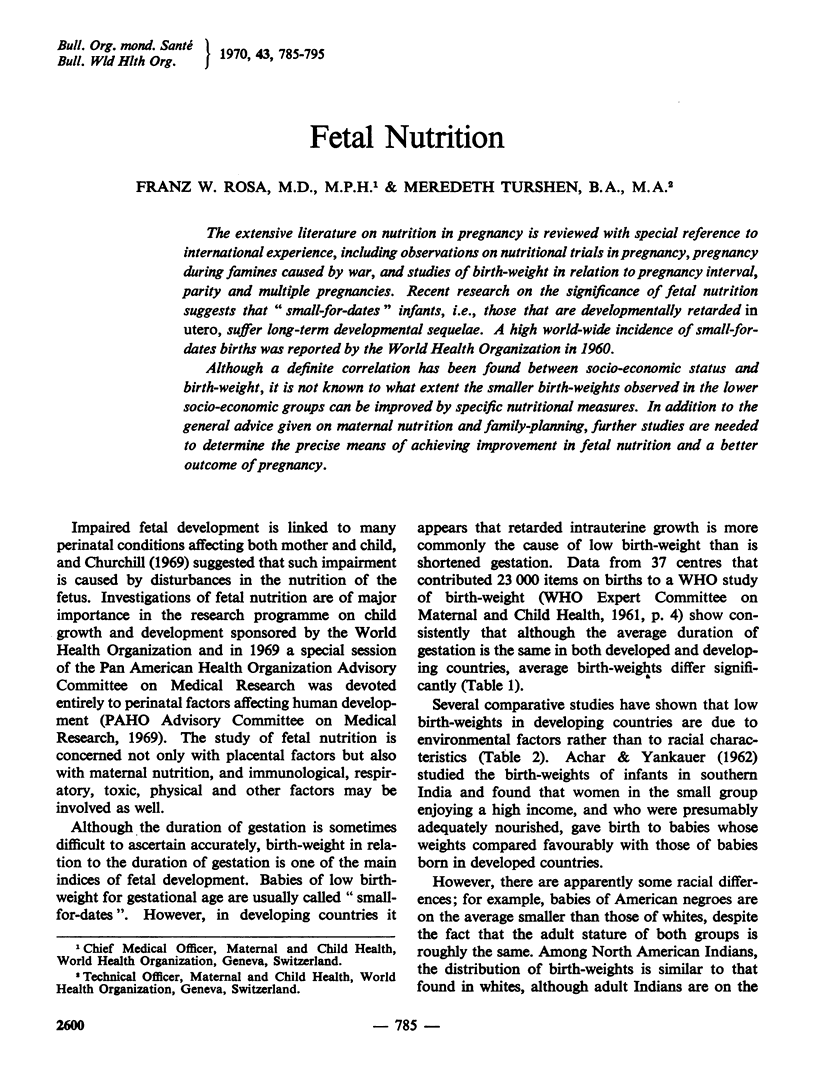
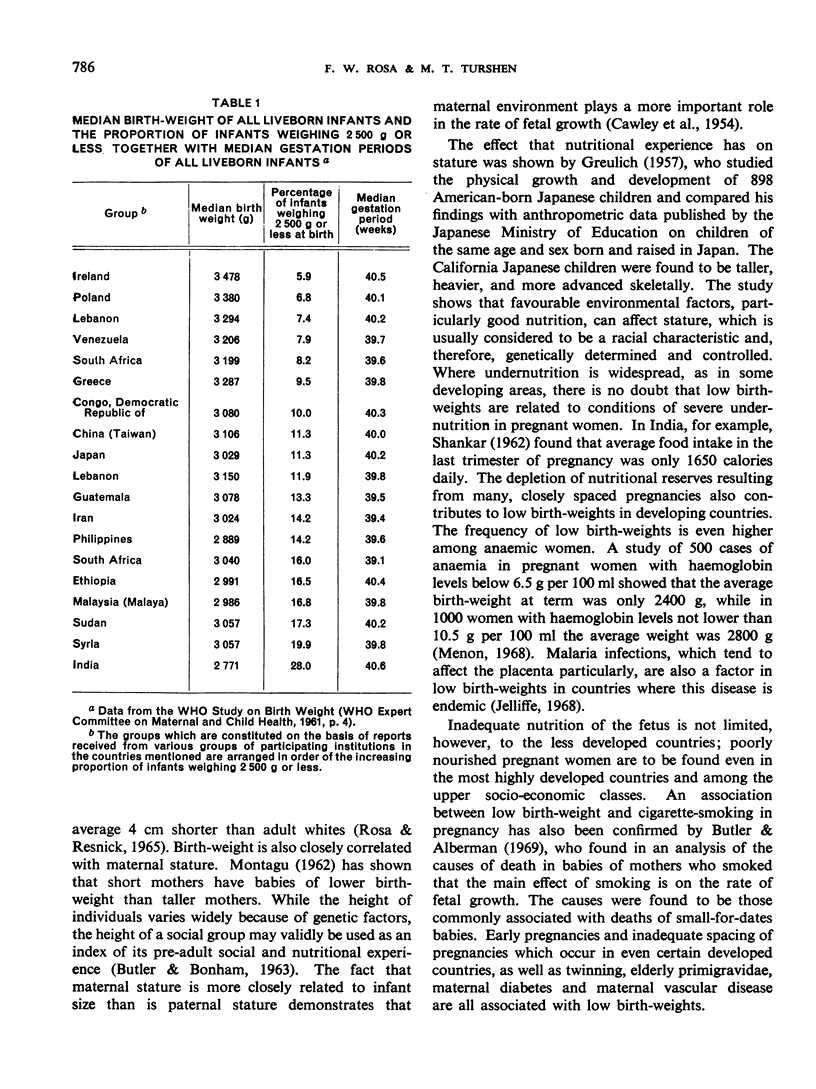
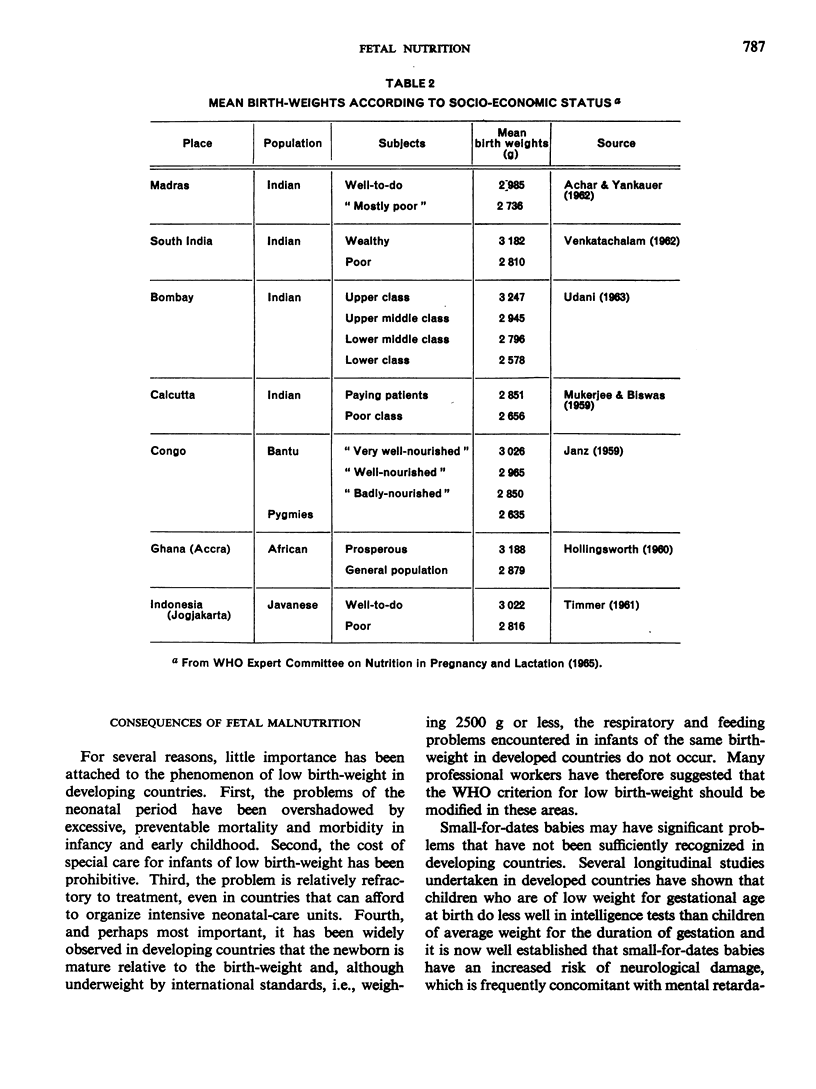
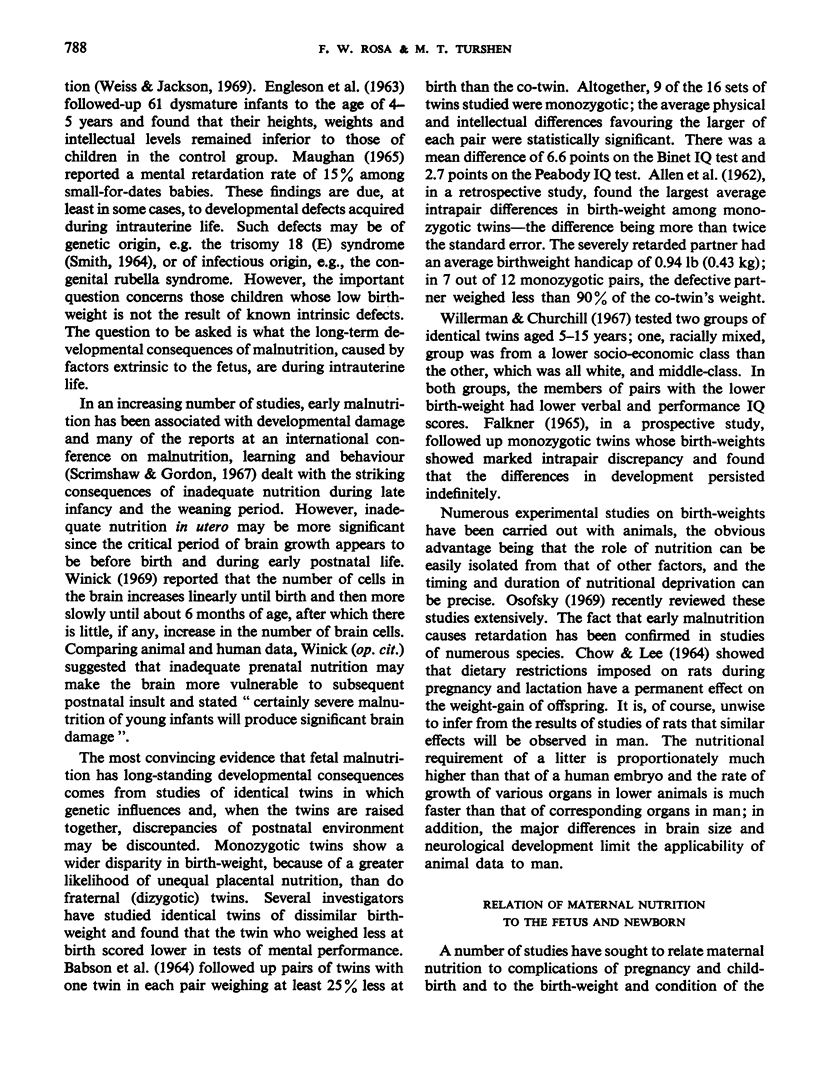
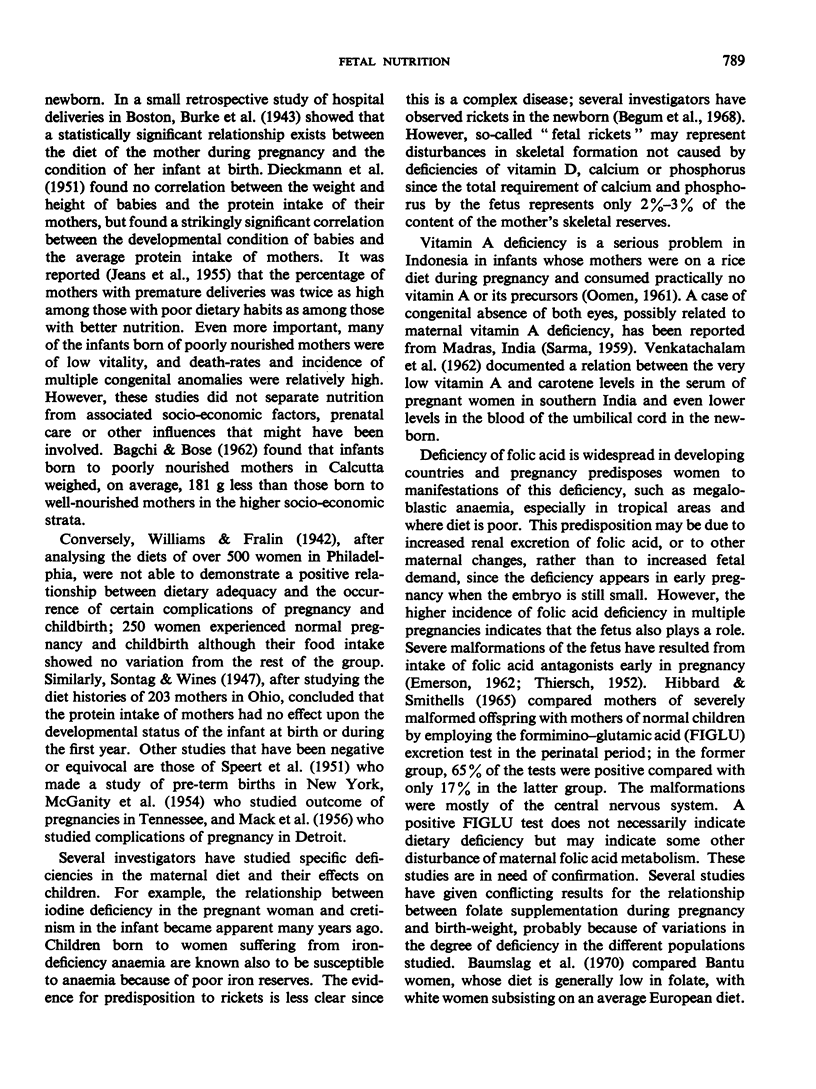
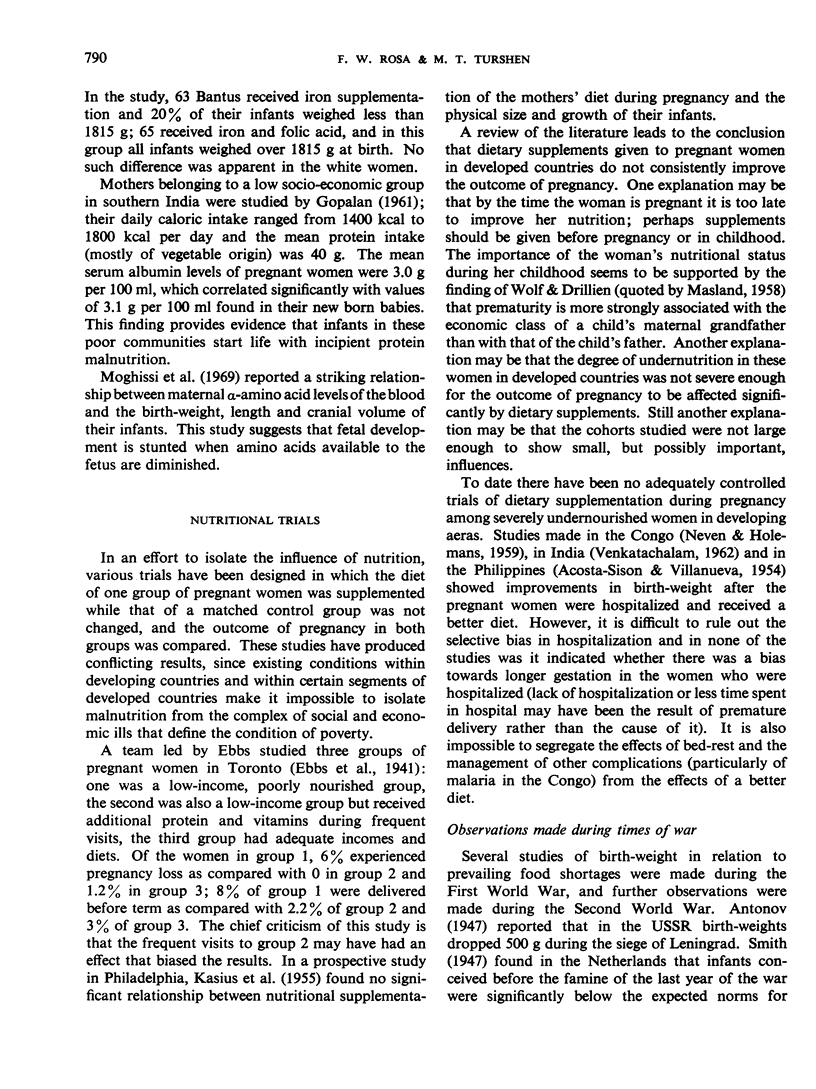
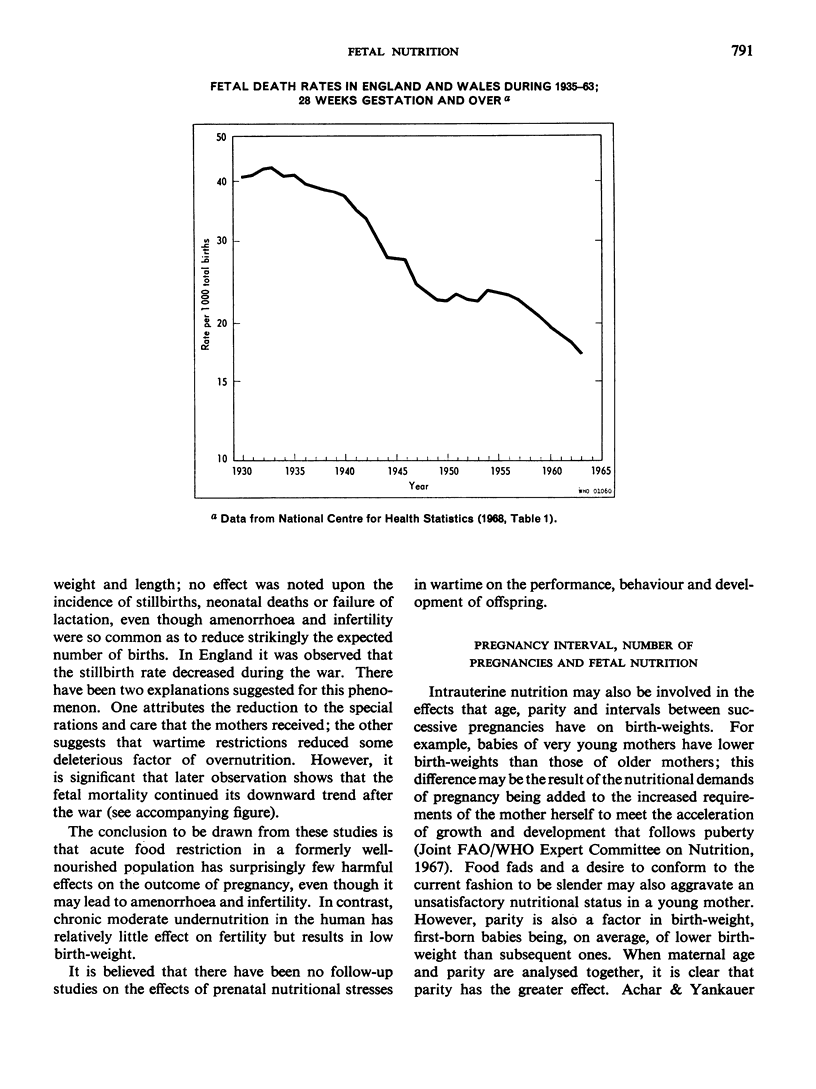
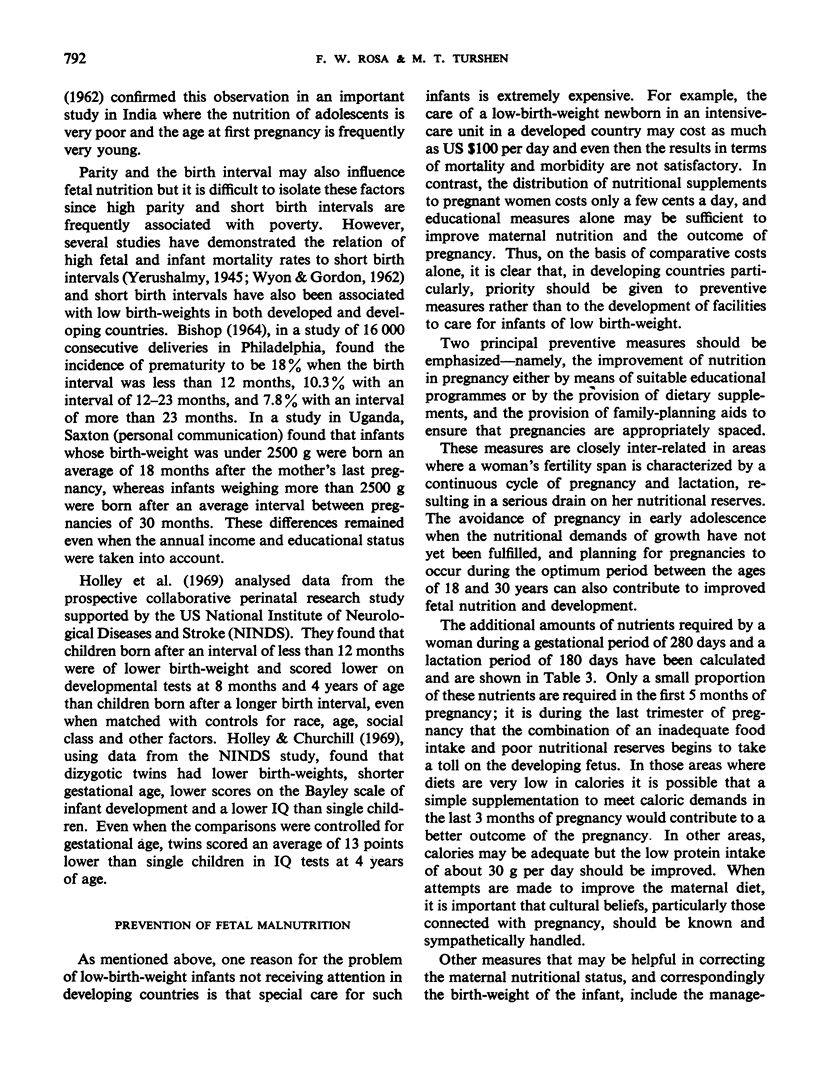
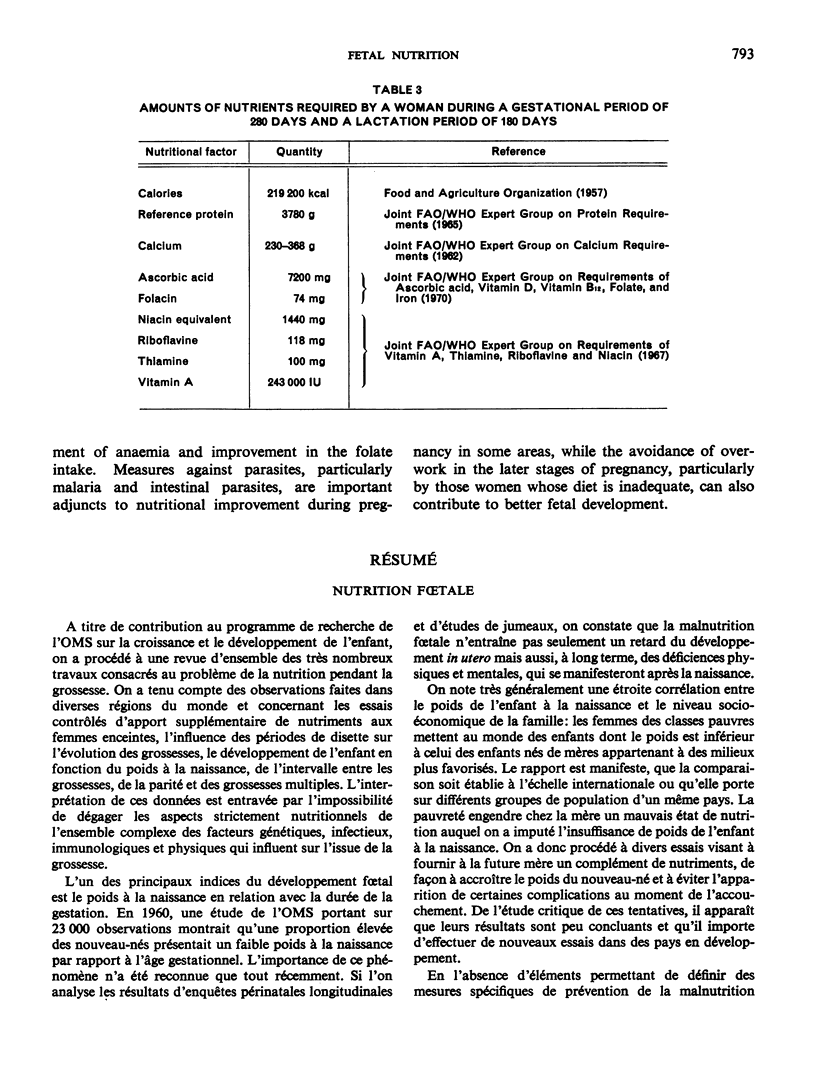
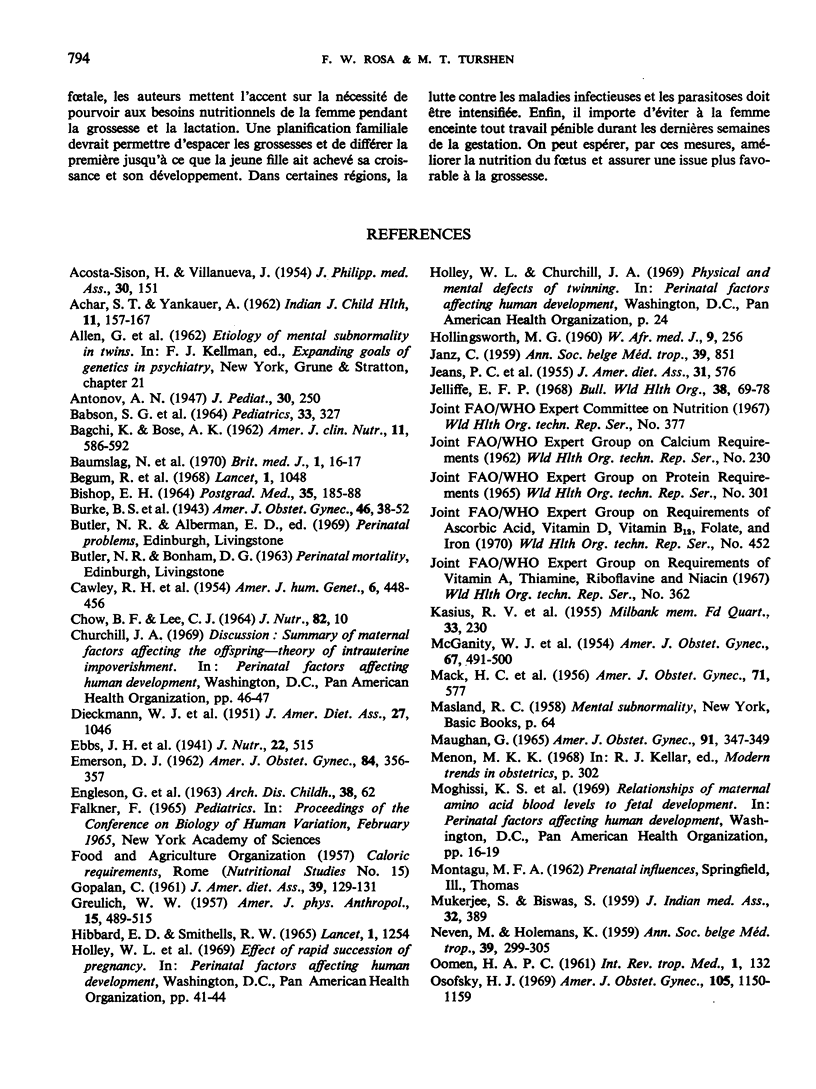
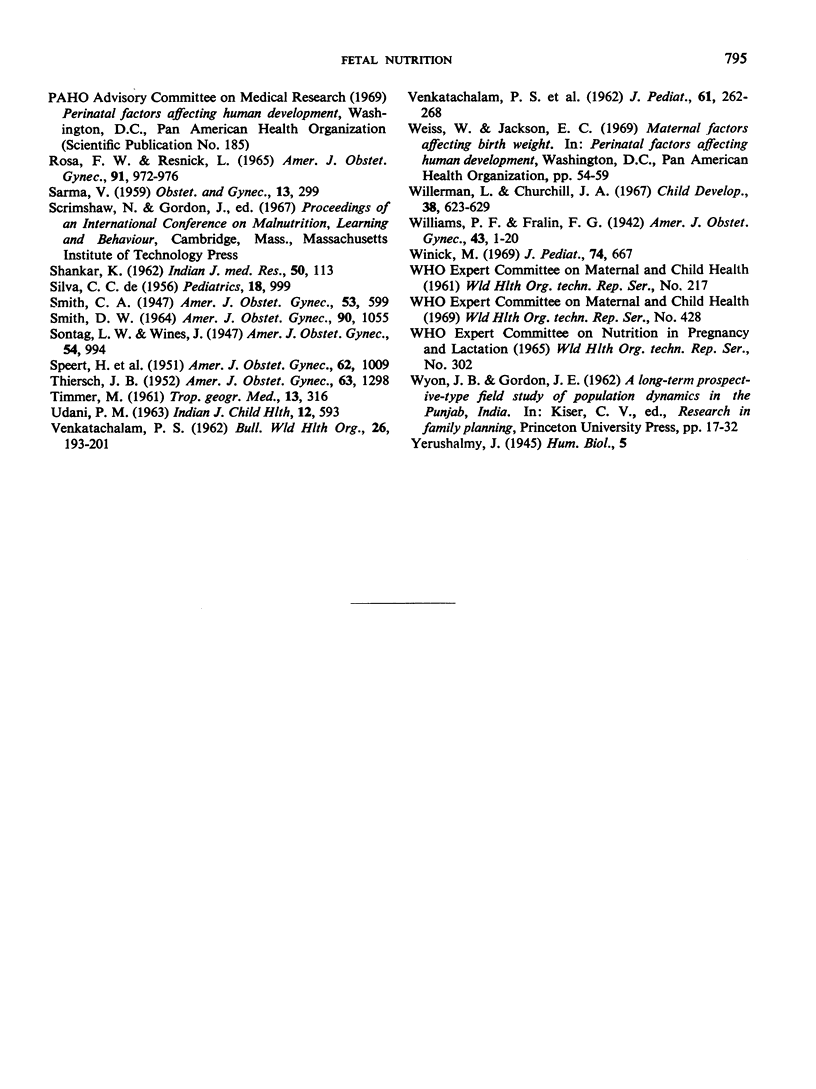
Selected References
These references are in PubMed. This may not be the complete list of references from this article.
- ACHAR S. T., YANKAUER A. Studies on the birth weight of South Indian infants. Indian J Child Health. 1962 Apr;11:157–167. [PubMed] [Google Scholar]
- ACOSTA-SISON H., VILLANUEVA J. Nutrition of women during pregnancy with Philippine food material. J Philipp Med Assoc. 1954 Apr;30(4):151–169. [PubMed] [Google Scholar]
- BABSON S. G., KANGAS J., YOUNG N., BRAMHALL J. L. GROWTH AND DEVELOPMENT OF TWINS OF DISSIMILAR SIZE AT BIRTH. Pediatrics. 1964 Mar;33:327–333. [PubMed] [Google Scholar]
- BAGCHI K., BOSE A. K. Effect of low nutrient intake during pregnancy on obstetrical performance and offspring. Am J Clin Nutr. 1962 Dec;11:586–592. doi: 10.1093/ajcn/11.6.586. [DOI] [PubMed] [Google Scholar]
- BISHOP E. H. PREMATURITY: ETIOLOGY AND MANAGEMENT. Postgrad Med. 1964 Feb;35:185–188. doi: 10.1080/00325481.1964.11695015. [DOI] [PubMed] [Google Scholar]
- Baumslag N., Edelstein T., Metz J. Reduction of incidence of prematurity by folic acid supplementation in pregnancy. Br Med J. 1970 Jan 3;1(5687):16–17. doi: 10.1136/bmj.1.5687.16. [DOI] [PMC free article] [PubMed] [Google Scholar]
- Begum R., Coutinho M. L., Dormandy T. L., Yudkin S. Maternal malabsorption presenting as congenital rickets. Lancet. 1968 May 18;1(7551):1048–1052. doi: 10.1016/s0140-6736(68)91408-6. [DOI] [PubMed] [Google Scholar]
- CAWLEY R. H., McKEOWN T., RECORD R. G. Parental stature and birth weight. Am J Hum Genet. 1954 Dec;6(4):448–456. [PMC free article] [PubMed] [Google Scholar]
- CHOW B. F., LEE C. J. EFFECT OF DIETARY RESTRICTION OF PREGNANT RATS ON BODY WEIGHT GAIN OF THE OFFSPRING. J Nutr. 1964 Jan;82:10–18. doi: 10.1093/jn/82.1.10. [DOI] [PubMed] [Google Scholar]
- DE SILVA C. C. Present state of child health in Ceylon. Pediatrics. 1956 Dec;18(6):999–1012. [PubMed] [Google Scholar]
- DIECKMANN W. J., TURNER D. F., MEILLER E. J., SAVAGE L. J., HILL A. J., STRAUBE M. T., POTTINGER R. E., RYNKIEWICZ L. M. Observations on protein intake and the health of the mother and baby. I. Clinical and laboratory findings. J Am Diet Assoc. 1951 Dec;27(12):1046–1052. [PubMed] [Google Scholar]
- EMERSON D. J. Congenital malformation due to attempted abortion with aminopterin. Am J Obstet Gynecol. 1962 Aug 1;84:356–357. doi: 10.1016/0002-9378(62)90132-1. [DOI] [PubMed] [Google Scholar]
- Engleson G., Rooth G., Törnblom M. A Follow-up Study of Dysmature Infants. Arch Dis Child. 1963 Feb;38(197):62–65. doi: 10.1136/adc.38.197.62. [DOI] [PMC free article] [PubMed] [Google Scholar]
- GOPALAN C. Maternal and infant nutrition in underdeveloped countries. J Am Diet Assoc. 1961 Aug;39:129–131. [PubMed] [Google Scholar]
- GREULICH W. W. A comparison of the physical growth and development of American-born and native Japanese children. Am J Phys Anthropol. 1957 Dec;15(4):489–515. doi: 10.1002/ajpa.1330150403. [DOI] [PubMed] [Google Scholar]
- HOLLINGSWORTH M. J. The birth weights of African and European babies born in Ghana. West Afr Med J. 1960 Dec;9:256–259. [PubMed] [Google Scholar]
- JEANS P. C., SMITH M. B., STEARNS G. Incidence of prematurity in relation to maternal nutrition. J Am Diet Assoc. 1955 Jun;31(6):576–581. [PubMed] [Google Scholar]
- Jelliffe E. F. Low birth-weight and malarial infection of the placenta. Bull World Health Organ. 1968;38(1):69–78. [PMC free article] [PubMed] [Google Scholar]
- KASIUS R. V., RANDALL A. I. V., TOMPKINS W. T., WIEHL D. G. Maternal and newborn nutrition studies at Philadelphia Lying-In Hospital: newborn studies. I. Size and growth of babies of mothers receiving nutrient supplements. Milbank Mem Fund Q. 1955 Jul;33(3):230–245. [PubMed] [Google Scholar]
- MACK H. C., KELLY H. J., MACY I. G. Complications of pregnancy and nutritional status. I. Toxemias of pregnancy. Am J Obstet Gynecol. 1956 Mar;71(3):577–595. doi: 10.1016/0002-9378(56)90484-7. [DOI] [PubMed] [Google Scholar]
- MUKHERJEE S., BISWAS S. Birth weight and its relationship to gestation period, sex, maternal age, parity and socio-economic status. J Indian Med Assoc. 1959 May 16;32(10):389–398. [PubMed] [Google Scholar]
- NEVEN M., HOLEMANS K. [Observation concerning birth weight in rural environment, Kwango, Belgian Congo]. Ann Soc Belg Med Trop (1920) 1959 Jun 30;39:299–305. [PubMed] [Google Scholar]
- Osofsky H. J. Antenatal malnutrition: its relationship to subsequent infant and child development. Am J Obstet Gynecol. 1969 Dec 1;105(7):1150–1159. doi: 10.1016/0002-9378(69)90143-4. [DOI] [PubMed] [Google Scholar]
- ROSA F., RESNICK L. BIRTH WEIGHT AND PERINATAL MORTALITY IN THE AMERICAN INDIAN. Am J Obstet Gynecol. 1965 Apr 1;91:972–976. doi: 10.1016/0002-9378(65)90564-8. [DOI] [PubMed] [Google Scholar]
- SARMA V. Maternal vitamin A deficiency and fetal microcephaly and anophthalmia; report of a case. Obstet Gynecol. 1959 Mar;13(3):299–301. [PubMed] [Google Scholar]
- SHANKAR K. The dietary intake and nutritional status of pregnant and nursing women in Hyderabad. Indian J Med Res. 1962 Jan;50:113–119. [PubMed] [Google Scholar]
- SMITH D. W. AUTOSOMAL ABNORMALITIES. Am J Obstet Gynecol. 1964 Dec 1;90:SUPPL–SUPPL:1077. doi: 10.1016/0002-9378(64)90835-x. [DOI] [PubMed] [Google Scholar]
- SPEERT H., GRAFF S., GRAFF A. M. Nutrition and premature labor. Am J Obstet Gynecol. 1951 Nov;62(5):1009–1019. doi: 10.1016/0002-9378(51)91020-4. [DOI] [PubMed] [Google Scholar]
- THIERSCH J. B. Therapeutic abortions with a folic acid antagonist, 4-aminopteroylglutamic acid (4-amino P.G.A) administered by the oral route. Am J Obstet Gynecol. 1952 Jun;63(6):1298–1304. doi: 10.1016/s0002-9378(16)38924-4. [DOI] [PubMed] [Google Scholar]
- TIMMER M. Prosperity and birthweight in Javanese infants. Trop Geogr Med. 1961 Dec;13:316–320. [PubMed] [Google Scholar]
- UDANI P. M. PHYSICAL GROWTH OF CHILDREN IN DIFFERENT SOCIO-ECONOMIC GROUPS IN BOMBAY. Indian J Child Health. 1963 Oct;12:593–611. [PubMed] [Google Scholar]
- VENKATACHALAM P. S., BELAVADY B., GOPALAN C. Studies on vitamin A nutritional status of mothers and infants in poor communities of India. J Pediatr. 1962 Aug;61:262–268. doi: 10.1016/s0022-3476(62)80261-3. [DOI] [PubMed] [Google Scholar]
- VENKATACHALAM P. S. Maternal nutritional status and its effect on the newborn. Bull World Health Organ. 1962;26:193–201. [PMC free article] [PubMed] [Google Scholar]
- Willerman L., Churchill J. A. Intelligence and birth weight in identical twins. Child Dev. 1967 Sep;38(3):623–629. [PubMed] [Google Scholar]
- Winick M. Malnutrition and brain development. J Pediatr. 1969 May;74(5):667–679. doi: 10.1016/s0022-3476(69)80129-0. [DOI] [PubMed] [Google Scholar]


